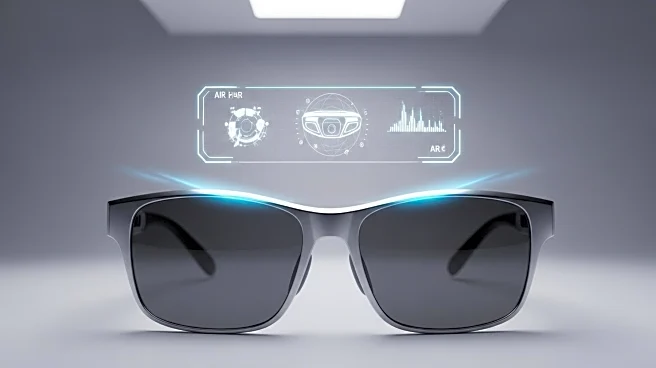What's Happening?
Meta has introduced its latest smart glasses, the Meta Ray-Ban Display, which feature an augmented reality (AR) display. Priced at $799, these glasses mark a significant step in Meta's strategy to dominate the AR market. The glasses are part of a broader lineup that includes the Ray-Ban Meta (Gen 2) and Oakley Meta Vanguard, which do not have displays but are crucial to Meta's market strategy. The partnership with EssilorLuxottica provides Meta with a vast distribution network, enhancing its market reach. The glasses have already seen significant adoption, with over 3.5 million units shipped as of mid-2025. Meta's pricing strategy suggests a willingness to subsidize hardware, posing a challenge to competitors like Google, who may struggle to compete on price.
Why It's Important?
The introduction of the Meta Ray-Ban Display glasses could significantly impact the AR market by setting a new standard for consumer expectations regarding price and technology. Meta's strategy of subsidizing hardware could lead to increased consumer access to advanced AR technology, potentially accelerating the adoption of smart glasses. However, this could also stifle competition, as rivals may find it difficult to match Meta's pricing strategy. In the long term, this could lead to a less competitive market, potentially hindering innovation and leading to higher prices for consumers. Meta's early lead in the market, combined with its extensive user base, positions it as a dominant player in the AR space.
What's Next?
Meta plans to launch the Display glasses exclusively in the U.S. with a limited rollout in select retail locations, focusing on providing a tailored experience for consumers. This approach aims to educate the market and gather feedback for future iterations. As Meta continues to refine its technology, competitors like Google may face challenges in catching up, especially with Meta's head start and established user base. The future of smart glasses could see Meta solidifying its position, potentially leading to a monopoly in the market.
Beyond the Headlines
Meta's strategy raises questions about the long-term implications for consumer choice and innovation in the AR market. With Meta potentially dominating the space, there is a risk of reduced competition, which could limit technological advancements and lead to higher prices. Additionally, the integration of AR technology into daily life poses ethical considerations regarding privacy and data security, as these devices become more personal and pervasive.










